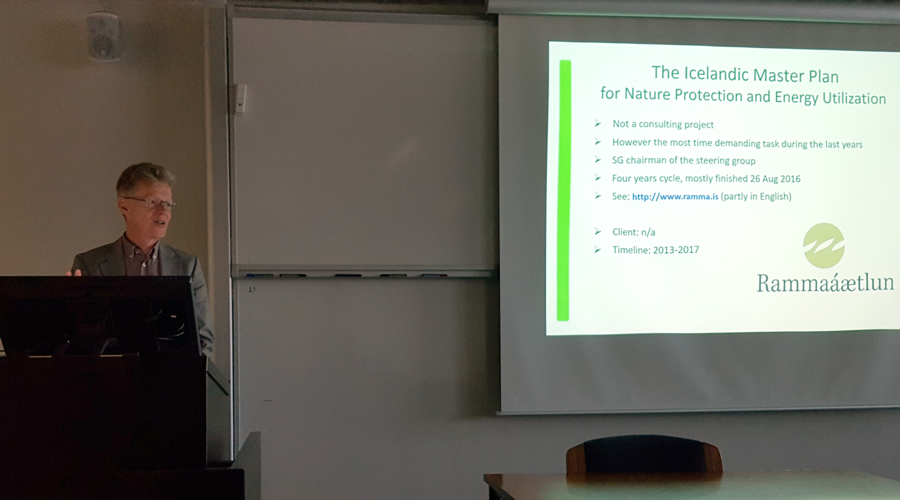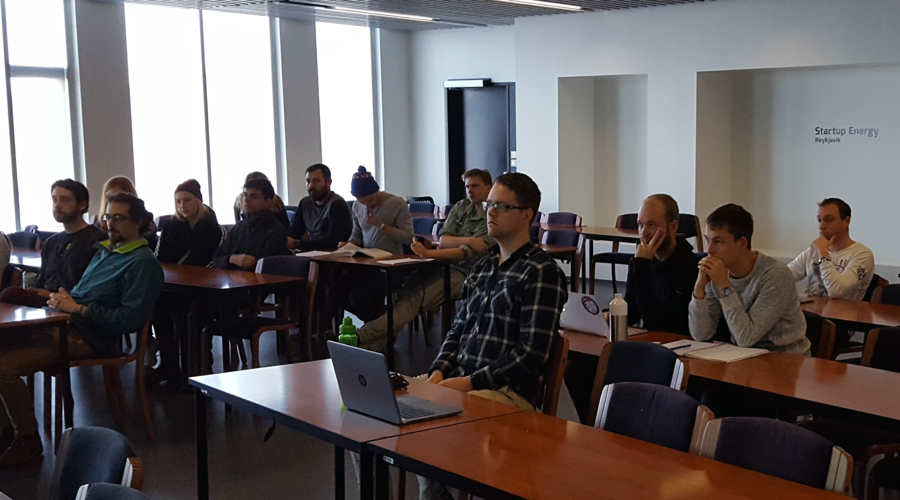Meet the Industry - 14 October 2016
An Environice presentation
This past Friday, ISE hosted the first meet the industry event of the year. Environice founder, owner and CEO, Stefán Gíslason gave a very interesting and insightful presentation to students about what his work as sustainability and environmental consultant entails and presented several projects his firm is currently involved in.  Environice is a small environmental consultancy based out of Borganes, Iceland with offices in Reykjavik and Cambridge, MA, USA. Founded in 2000, today they employ three people and provide a multitude of services surrounding environmental and sustainability issues, including policy advising, certification support and environmental monitoring. Most of their work is performed for the Icelandic market but a few projects are also conducted in cooperation with partners from Scandinavia and the Nordics.
Environice is a small environmental consultancy based out of Borganes, Iceland with offices in Reykjavik and Cambridge, MA, USA. Founded in 2000, today they employ three people and provide a multitude of services surrounding environmental and sustainability issues, including policy advising, certification support and environmental monitoring. Most of their work is performed for the Icelandic market but a few projects are also conducted in cooperation with partners from Scandinavia and the Nordics.
In his presentation, Stefán Gíslason presented a handful of projects his firm have been involved in or are currently undertaking. Examples he listed covered a wide array of sustainability and environmental questions, including developing a teaching plan about Maritime pollution or the environmental monitoring of land-fill sites in Iceland, for example. Other work includes the calculation of companies' carbon footprints of projects along the creation of an evaluation matrix for new projects ideas and the recommendations on revision of environmental policies of these companies. In cooperation with partners from Scandinavia, they are involved in the creation of a Nordic textile certification system that enforces and ensures the sustainable use of the collected textiles.
Due to tourism booming in Iceland, sustainability and environmental friendliness of tourist destinations needs to be maintained and secured. For this several certification schemes are being created currently. Environice has partaken in the creation of at least two of them, one for the Westfjords with the declared aim of incroporating many elements of the successful practice which has taken place on the Snæfellsnes peninsula. The second one listed by Stefán Gíslason is the newly established Icelandic Vakinn scheme that comprises a large catalogue of criteria and several possible levels of performance.
As part of their environmental impact assessment service, Environice and Stefán have contributed a report to the third phase of the Icelandic Master Plan for Nature Protection and Energy Utilization, Rammaáætlun . This master plan has been established in 1999, specifying which of Iceland's sites suited for either geothermal or hydropower utilization can in fact be developed in the future and which sites are to be preserved to free from development.

In his words, it is crucial that we do not stop with a few sustainability focused projects in order to try and combat the tremendous environmental challenges we are facing. Much rather it is crucial to foster a grander change of culture towards a sustainable and conscious focused actions. Stefán has been active in trying to bring about such a change in Iceland for a while by providing weekly or bi-weekly articles on sustainability and environmental issues to the Icelandic Broadcasting survey. By keeping the public as informed about issues as possible, such a transition is much more likely to occur, he claims. This is also where our students can play a critical role. Sustainable energy technologies have the potential to aide such a change in mentality, through their presence and deployment on a grander scale, they can act as poster-children for a more sustainable mentality.
We would like to thank Stefán Gíslason that he took the time to come and give the very interesting presentation today.
